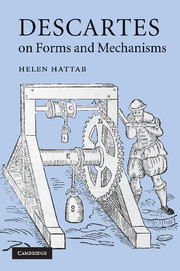Book contents
- Frontmatter
- Contents
- Acknowledgments
- List of abbreviations
- Introduction
- PART I RESURRECTING THE SUBSTANTIAL FORM
- PART II CHALLENGING THE SUBSTANTIAL FORM
- 4 Sanchez's skeptical humanist attack
- 5 The mechanical alternative to substantial forms
- 6 Cartesian science and the principles of Aristotelian mechanics
- PART III ELIMINATING SUBSTANTIAL FORMS
- Works cited
- Index
4 - Sanchez's skeptical humanist attack
Published online by Cambridge University Press: 15 September 2009
- Frontmatter
- Contents
- Acknowledgments
- List of abbreviations
- Introduction
- PART I RESURRECTING THE SUBSTANTIAL FORM
- PART II CHALLENGING THE SUBSTANTIAL FORM
- 4 Sanchez's skeptical humanist attack
- 5 The mechanical alternative to substantial forms
- 6 Cartesian science and the principles of Aristotelian mechanics
- PART III ELIMINATING SUBSTANTIAL FORMS
- Works cited
- Index
Summary
Francisco Sanchez (a.k.a. Franciscus Sanctius, 1551–1623) was a philosopher and physician who studied medicine at the University of Bordeaux, and at La Sapienza in Rome, a course of study that exposed him to both Aristotelian and Galenic natural philosophy. In 1573, after two years in Italy, where the more innovative fields of natural history, botany, and anatomy were already being taught, he returned to France and completed his doctorate at the University of Montpellier. While in Montpellier he taught a course for surgeon apprentices, and in 1575 he moved to Toulouse, where he is said to have devoted himself to philosophical and mathematical studies. During this time, Sanchez corresponded with the Jesuit mathematician Christoph Clavius about an unpublished mathematical work he (Sanchez) had written. After failing to secure a chair in medicine at both the universities of Montpellier and Toulouse, the embittered Sanchez took a position as a doctor at a charitable institution in 1582, where he would remain for thirty years. In addition to this position, he accepted a chair in philosophy at the University of Toulouse in 1585, which he occupied until 1612. At age sixty-one, he finally secured a position as Professor of Medicine at the University of Toulouse.
In 1581 Sanchez published the skeptical treatise he had been working on since 1574. That Nothing is Known secured Sanchez's place as intellectual rabble-rouser.
- Type
- Chapter
- Information
- Descartes on Forms and Mechanisms , pp. 69 - 84Publisher: Cambridge University PressPrint publication year: 2009



